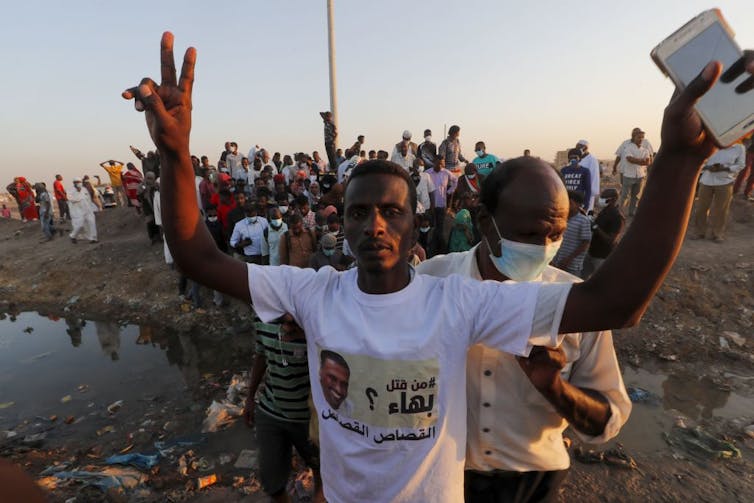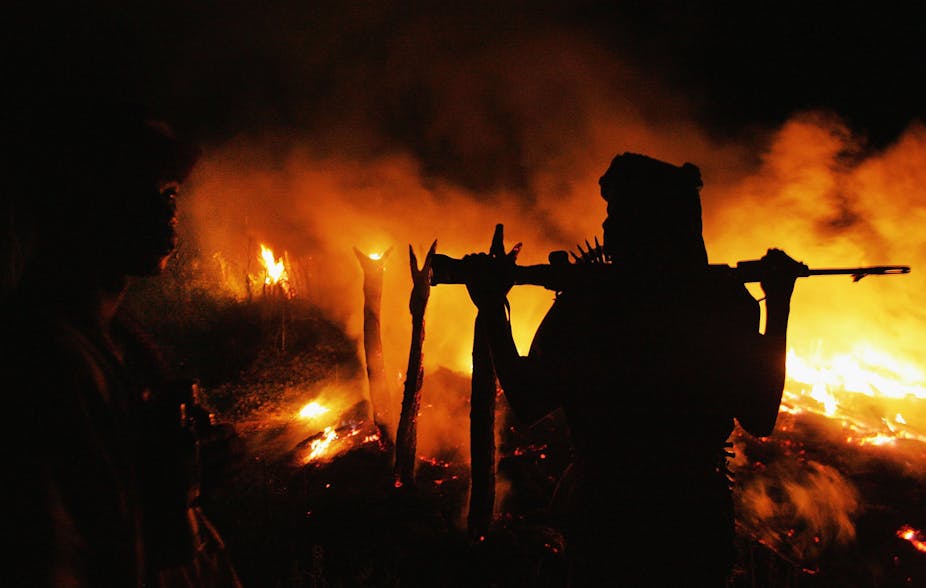Sudan is in crisis. Fighting continues between Sudan’s military leader, Abdelfattah Al-Burhan, and his deputy on Sudan’s ruling council, General Mohamed Hamdan Dagolo, who commands the paramilitary group the Rapid Support Forces (RSF).
Moina Spooner, from The Conversation Africa, asked Sudan historian and conflict expert Tsega Etefa to unpack what led to this eruption in violence and provide insights into who the RSF are.
What’s at the centre of the conflict?
The Rapid Support Forces and the army are fighting over a disagreement on the future of the country after the removal of the former president Omar al-Bashir in 2019. Al-Bashir was ousted following widespread public protests which started in 2018 over the cost of bread. These eventually challenged his entire regime, which had been in place for over 30 years.
Along with the army, the paramilitary force played a key role in the removal of al-Bashir. A Sovereign Council, made up of civilian and military factions, was established as an interim government. And, in August 2019, Abdalla Hamdok became Prime Minister.
However, in October 2021 Hamdok was removed in another coup jointly led by the army chief Lt.Gen. Abdelfattah Al-Burhan, Rapid Support Force commander General Mohamed Hamdan Dagolo, “Hemedti”, and other security officers. This followed months of simmering tensions between the civilian and military elements of the council coupled with harsh economic condition and protests.
Following months of widespread protests to bring the country back to civilian rule, a final political framework agreement to transition was tabled. It was due to be signed on April 1, 2023.
On the surface, Sudan looked like it was moving in the right direction. But several factors worked against it - the most important of which was disagreement between the army chief Al-Burhan and head of the Rapid Support Forces, Hemedti. The two could not agree on the timetable and modalities of the inclusion of the members of paramilitary group into the army. The army still remains one of the “bastions” of the al-Bashir era government and discussion are ongoing on how to reform.
Finally, Hemedti accused al-Burhan of giving key positions to the members of former regime and that al-Burhan intends to remove him from political scene. This delayed the final signing of the framework agreement and led to the outbreak of conflict on April 15, 2023. Both blame each other for starting the clashes.
Who are the Rapid Support Forces and how did they get to be so powerful?
Known as al-Quwat al-Da’m al-Sari’ in Arabic, the paramilitary force was created in 2013 by the government of al-Bashir. The government’s plan was to establish a well-trained, well-equipped, and centrally integrated security force that could be deployed against threats to its regime.
Hemedti, an Abbala Arab of the Hemedti clan, was selected by al-Bashir as the leader. Hemedti is a former Janjaweed commander. The Janjaweed are an armed militia with Arab lineage from Darfur and Kordofan in western Sudan. They were notorious for carrying out atrocities in Darfur under instruction from al-Bashir in the 2000s.
By 2021, the paramilitary group was estimated to number between 75,000 and 100,000 men, compared with the Sudanese Armed Forces’s 120,000 to 200,000 troops. The great majority of Rapid Support Forces personnel are Darfurians, many were picked by Hemedti.
Since their inception, the paramilitary group has created havoc by targeting civilian villages and committing atrocities including rapes in Darfur, South Kordofan and Blue Nile states. For instance, in 2014 and 2015 the RSF, under Hemedti’s command, was deployed by government to Darfur. They looted civilian properties and raped women, including young girls. The targeting of civilians to eliminate support base for the rebels has become the hallmark of their activities.
Ironically, though the paramilitary group was created to protect al-Bashir’s government from threats, Hemedti played a key role in the removal of al-Bashir from power in April 2019.
Is the power of the Rapid Support Forces a cause for concern?
Yes - and this is largely because of their roots: the Janjaweed.
The Janjaweed militia originated in the mid-1980s when there was a collapse of law and order in the Darfur region. This was due to a combination of factors, including famine, marginalisation by Khartoum, outbreak of civil war between the north and south of Sudan and Chadian rebels and Libyan military activities.
Darfurians began to arm themselves, forming militias for protection though they largely operated to grab land and restock lost animals. The term “Janjaweed” applies to all Arab armed groups irrespective of their origins. For example, they could be Chadian, Libyan or from other non-Sudanese backgrounds. But most of them were Arabs from Darfur.

I believe that their roots – as a self-interested militia that operates outside of the law – continues to dictate their actions today.
Though the paramilitary group is a part of the Sudanese security sector, they pursue a different pattern of violence to the Sudanese police and military. They target civilians and commit atrocities. For instance, they’ve forced the displacement of entire communities and used food as a weapon of war. They’ve been known to torture and commit extrajudicial killings and mass rapes. They have also been accused of murder and rape during the civilian 2019 protests in Khartoum.
Because it continues to operates somewhat independently under Hemedti’s command, it creates a huge problem for the nation. The Rapid Support Forces should be disbanded and its members be given the option of joining the army or police – or returning to civilian life. A country cannot have so many disjointed security forces. They need to be integrated, retrained and placed under unified command.
The paramilitary group’s history of brutality and impunity suggests that the increase in its activities will drive instability in Sudan. Its strong presence in politics will not help in the creation of trust that’s needed to move negotiations forward.
A new political framework agreement is needed that is inclusive and that has the trust and support of Sudanese people. The military is there to protect and safeguard the nation and should not be the dominant force in the political process.
The ongoing fighting has to stop and genuine negotiations should be given a chance. The Inter Governmental Authority on Development should continue to play a negotiating role and assist in the democratisation efforts. Though Sudan has a history of coups and civil wars, they also have a history of peaceful resolution to their problems. The first South vs. North Sudan civil war ended peacefully in 1972. The second civil war also ended peacefully in 2005.

